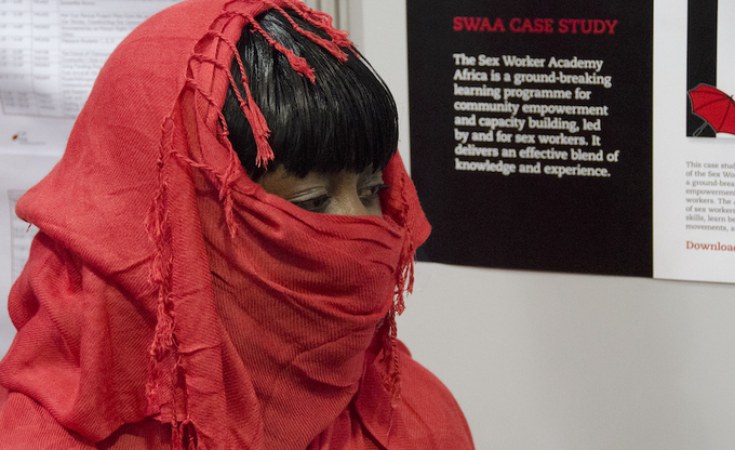During the pandemic, business shifted from in person to work-from-home, which quickly became the new normal. However, it left many workers high and dry, especially those with less "socially acceptable" occupations.
The pandemic has adversely impacted sex workers globally and substantially increased the precariousness of their profession. And public health measures put in place made it almost impossible for sex workers to provide any in-person service.
Although many people depend on sex work for survival, its criminalization and policing stigmatizes sex workers.
Research shows that globally, sex workers have been left behind and in most cases excluded from government economic support initiatives and social policies. There needs to be an intersectional approach to global COVID-19 recovery that considers everyone's lived realities. We propose policy recommendations that treat sex work as decent work and that centre around the lived experiences and rights of those in the profession.
Sex work and the pandemic
The United Nations Population Fund (UNFPA) recently reported that apart from income-loss, the pandemic has increased pre-existing inequalities for sex workers.
In a survey conducted in Eastern and Southern Africa, the UNFPA found that during the pandemic, 49 per cent of sex workers experienced police violence (including sexual violence) while 36 per cent reported arbitrary arrests. The same survey reported that more than 50 per cent of respondents experienced food and housing crises.
Lockdowns and border closures adversely impacted Thailand's tourism industry which relies partially on the labour of sex workers.
In the Asia Pacific, sex workers reported having limited access to contraceptives and lubricants along with reduced access to harm reduction resources. Lockdowns also disrupted STI or HIV testing services, limiting sex workers' access to necessary healthcare.
In North America, sex workers have been excluded from the government's recovery response. And many began offering online services to sustain themselves.
Government vs. community response
Globally, sex workers have been left to fend for themselves during the pandemic with little to no support from the government. But communities themselves have been rallying.
Elene Lam, founder of Butterfly, an Asian migrant sex organization in Canada, talks about the resilience of sex wokers during the pandemic.
She says organizations like the Canadian Alliance for Sex Work Law Reform are working in collaboration with Amnesty International to mobilize income support and resources to help sex workers in Canada.
Organizations in the United Kingdom, Germany, India and Spain have also set up emergency support funds. And some sex worker organizations have developed community-specific resources for providing services both in person and online during the pandemic.
Global recovery needs to include sex workers
The International Labour Organization's "Decent Work Agenda" emphasizes productive employment and decent working conditions as being the driving force behind poverty reduction.
Sociologist Cecilia Benoit explains that sex work often becomes a "livelihood strategy" in the face of income and employment instability. She says that like other personal service workers, sex workers also should be able to practice without any interference or violence.
In order to have an inclusive COVID-19 recovery for all, governments need to work to extend social guarantees to sex workers -- so far they haven't.
As pandemic restrictions disappear, it is crucial to ensure that everyone involved in sex work is protected under the law and has access to accountability measures.
Recommendations
As feminist researchers, we propose that sex work be brought under the broader agenda of decent work so that the people offering services are protected.
- Governments need to have a legal mandate for preventing sexual exploitation.
- Law enforcement staff need to be trained in better responding to the needs of sex workers. To intervene in and address situations of abuse or violence is critical to ensure workplace safety and harm reduction.
- Awareness and educational campaigns need to focus on destigmatizing sex work.
- Policy-makers need to incorporate intersectionality as a working principle in identifying and responding to the different axes of oppression and marginalization impacting LGBTQ+ and racialized sex workers.
- Engagement with sex workers and human rights organizations need to happen when designing aid support to ensure that an inclusive pathway for recovery is created.
- Globally, there needs to be a steady commitment towards destigmatizing sex workers and their services.
Despite the gradual waning of pandemic restrictions, sex workers continue to face the dual insecurity of social discrimination and loss of income support. Many are still finding it difficult to stay afloat and sustain themselves.
Societally, we need to recognize that sex workers have agency and deserve the same respect, dignity and aid as any other person selling their labour.
Deeplina Banerjee, PhD Candidate, Gender, Sexuality and Women Studies, Western University
Andrea Burke, PhD Candidate, Gender Sexuality and Women's Studies, Western University


